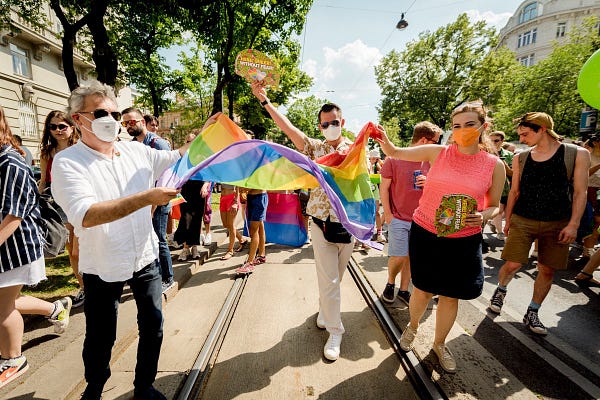Pride and Prejudice
Green government ministers took part in this month's Pride demonstration in Vienna but have had little success turning their support for LGBTQ rights in policy
Servus!
Normal service resumed—or resumed as best it can—over the weekend. Having been cancelled in 2020 due to the pandemic, Vienna Pride took over the Ringstrasse on Saturday, this year taking place on foot or bike as opposed on floats and trucks. The parade was noteworthy, among other things, for the number of government ministers who took part, this being the first Pride to take place under the ÖVP-Green coalition. Vice chancellor Werner Kogler, justice minister Alma Zadić, and health minister Wolfgang Mückstein were among those who marched around the Ring in the sweltering heat on Saturday afternoon.
Missing in action, as one might expect given their status as the political party of the Catholic camp in Austria, were representatives of note from the conservative People’s Party (ÖVP). LGBTQ rights are, along with immigration, one of the areas over which the two parties are simply irreconcilable. They agree to recognize one another’s differences rather than confront them head on in an attempt to create a synthesis. The result of this is a kind of statis: although there is little evidence of backsliding on important human rights issues, there has not been a great deal of progress either.
Blood donation is one example of this. In Austria, as in many other European countries, there is a de facto ban on men giving blood who have had sex with men within a certain time period prior to the attempted donation. In March, the health ministry reduced that period to 4 months, though the Red Cross continues to implement a 12-month ban. The opposition, in particular the Social Democratic Party (SPÖ) and NEOS, would like to see the ban lifted altogether, but Mückstein has thrown up his hands and indicated the final decision rests in the hands of those who, like the Red Cross, take the donations. The Red Cross in Austria is, incidentally, an organization close to the ÖVP.
Another example is the intersection of human rights issues and foreign policy, the foreign ministry and the role of Europe minister being in the hands of the ÖVP. Last week, over the border in Hungary, the Orbán regime adopted a number of new amendments which discriminate against and attempt to marginalize and stigmatize the country’s LGBTQ community. The amendments equating homosexuality with pedophilia were tabled in parliament by Orbán’s Fidesz party and introduce a ban on the “portrayal and the promotion of gender identity different from sex at birth, the change of sex, and homosexuality” for people under the age of 18.
Among other things, this means sexual orientation and gender identity cannot be discussed in schools or portrayed in public service announcements. The pressure group ILGA Europe believes “the amendments clearly breach a number of EU laws and violate international human rights norms,” while 14 EU member states signed on a joint declaration over the course of last night and this morning condemning the amendments which states including France and Germany believe “discriminate against LGBTIQ persons and violate the right to freedom of expression under the pretext of protecting children.”

Absent from the list of signatories initially was Austria, who joined other states from central and eastern Europe in not signing onto the declaration initiated by the Benelux states. The equation of homosexuality and pedophilia is one of the oldest tricks in the book, yet Europe minister Karoline Edtstadler said yesterday evening in Brussels that the protection of minors against pedophilia was a “very important matter” which required “strong penalties,” as if that were the actual matter at hand. Only late this morning did she back down and report that after much “consideration and examination” would Austria sign the declaration. With the ÖVP, it would be easier for the Greens to walk a camel through the eye of a needle that make progress on the social and human rights issues they care about.
Bis bald!
Thank you for signing up to the Vienna Briefing. If you know someone who would be interested in receiving this newsletter, consider sharing it with them today.
Tooor!
Austria qualified for the last 16 of a European Championships for the first time after a 1-0 win over Ukraine on Monday in Bucharest. Austria will now face Italy in London on Saturday. Striker Marko Arnautović featured in Monday’s game having sat out last week’s 0-2 defeat at the hands of Netherlands. UEFA had imposed a one-game ban as punishment for his overzealous, xenophobic celebration during Austria’s 3-1 win over North Macedonia.
Back to Blümel
Finance minister Gernot Blümel has rejected accusations he and his ministry failed to deliver all the necessary documents to the parliamentary committee investigating the allegation raised by the Ibiza tapes. President Alexander Van der Bellen turned to the constitutional court last week in order to examine whether and ensure that all requested documents had been handed over.
Changing of the Red Guard
Mirko Messner has stepped down as head of the Communist Party (KPÖ) after 15 years at the helm. The marginal party will now be led by Günther Hopfgartner and a new generation of spokespeople.





